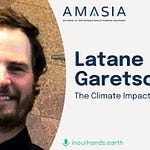In this episode, Ramanan speaks with Mark Stoll, a professor of environmental and religious history at Texas Tech University, where he also serves as director of Environmental Studies.
Stoll has written two books about the American environmental movement's significant formative religious influences: Protestantism, Capitalism, and Nature in America (1997) and Inherit the Holy Mountain: Religion and the Rise of American Environmentalism (2015). His newest book, Profit: An Environmental History, is an environmental history of capitalism and has been described by such figures as Bill McKibben and Katherine Hayhoe as a “must-read” outlining “the central tale of the human story.”
They discuss the influence of religion on environmentalism, underrecognized environmentalists, and how to rehabilitate capitalism. Time stamps and the full transcript are below. This episode is also available on Apple Podcasts and Spotify.
Full transcript available above. In Our Hands is a production of Amasia. Follow these links for more about our firm, the Amasia blog, our climate fiction podcast, and Ramanan’s blog.
Highlights
[00:09:46] Intentions of Profit
[00:15:18] Rehabilitating Capitalism
[00:20:40] Forgotten Environmental Figures












